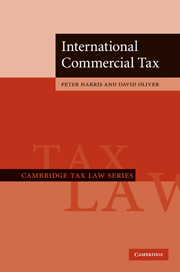Book contents
- Frontmatter
- Contents
- Preface
- List of abbreviations
- Table of Cases
- Table of statutes
- Table of treaties
- Introduction
- 1 Fundamentals and sources of international tax law
- 2 The jurisdiction to tax
- 3 Source country taxation
- 4 Residence country taxation
- 5 The limited scope of treaties
- 6 Changes of source and residence
- 7 Bilateral administrative issues
- Conclusion
- References
- Index
7 - Bilateral administrative issues
Published online by Cambridge University Press: 03 May 2011
- Frontmatter
- Contents
- Preface
- List of abbreviations
- Table of Cases
- Table of statutes
- Table of treaties
- Introduction
- 1 Fundamentals and sources of international tax law
- 2 The jurisdiction to tax
- 3 Source country taxation
- 4 Residence country taxation
- 5 The limited scope of treaties
- 6 Changes of source and residence
- 7 Bilateral administrative issues
- Conclusion
- References
- Index
Summary
After dealing with source country and residence country taxing rights, the OECD Model is rounded out with a number of provisions targeted at bilateral tax administration issues. There are four core areas of tax administration, collection of information, assessment, dispute resolution and collection of tax. A tax administration needs access to information for purposes of making or checking tax assessments. This access may be either voluntary (e.g. by the taxpayer submitting a return) or forced (e.g. audit powers). Based on the information collected, an assessment or tax decision will be made. These are of two types, either self-assessment by the taxpayer or an administrative assessment, including an amendment of a self-assessment.
Once an assessment or tax decision is set or accepted by the tax administration, there is scope for dispute with the taxpayer regarding, among other things, the quantum of the assessment. Accordingly, tax laws typically provide two mechanisms for resolving disputes. The first is a review procedure internal to the tax administration, commonly called an ‘objection’ procedure. If the taxpayer and the tax administration fail to reach agreement, there is usually a subsequent independent review. Commonly, this will be to a specialist tax tribunal with the potential for further appeal to the general courts, although in some countries the appeal is directly to the general courts.
Finally, at least when the assessment or tax decision is not disputed (or not capable of dispute), there is the issue of collecting tax or enforcing the decision.
- Type
- Chapter
- Information
- International Commercial Tax , pp. 452 - 466Publisher: Cambridge University PressPrint publication year: 2010



